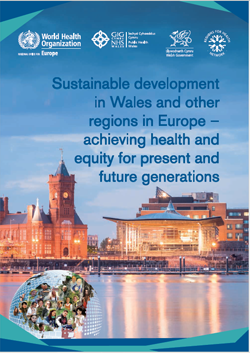Implementing the 2030 Agenda: case studies from the Regions for Health Network

As part of its role to support the Member States, the WHO Regions for Health Network (RHN) has identified best practice and relevant experience, which can boost the implementation of the United Nations 2030 Agenda for Sustainable Development (2015). This information was recently compiled in a new publication entitled “Sustainable development in Wales and other regions in Europe – achieving health and equity for present and future generations”. It clearly demonstrates the key role of regions and the subnational level in translating global priorities into effective policy and action.
In documenting both the challenges met by the regions, as well as their drivers of change, the publication also highlights ways in which RHN can help to promote similar processes elsewhere, both within and beyond the borders of the WHO European Region. It focuses on the following six case studies.
Wales (United Kingdom) has a history of commitment towards sustainable development and has employed strategies to improve public participation, political debate and intersectoral work, all of which have been implemented through the innovative structure of the ground-breaking Well-being of Future Generations (Wales) Act 2015. The Act aims to improve the social, economic and cultural well-being of Wales by placing a duty on public bodies to work together to achieve seven defined well-being goals, taking a more long-term, sustainable approach. Key sectors prepared for and responded to the legislation through the participation of the local government in the Early Adopters Programme; the involvement of the health sector through the local health boards, and the experiences of Public Health Wales. This, in turn, necessitated capacity-building and training activities.
The Pomurje region (Slovenia) was selected as the first area in the country to pilot Programme Mura, the national intersectoral programme for the reduction of inequities. By setting up a council of stakeholder representatives and identifying four development areas aligned to the Sustainable Development Goals, the Programme has helped key partners view health as an investment and development opportunity. There have been numerous challenges to cooperation, such as the lack of resources and a legal framework, but the key enabler has been capacity-building at the individual and institutional levels.
The North Rhine-Westphalia region (Germany) has developed an intersectoral local public health action plan as a tool for use by the public health sector in optimizing participation in municipal policy-making and planning procedures. The action plan supports capacity-building for sustainable, healthy urban development and can be used to detect and assess social and health inequities and vulnerable population groups. It will be reviewed and further developed to reflect specific topics as well as its applicability at the subdistrict or even neighbourhood levels.
The Health Promoting Kaunas Region (Lithuania) is implementing the Lithuanian Health Programme for 2014–2025, and has developed an action plan on the reduction of health inequities at the regional level. The key factor in the process was the engagement and active participation of politicians, a range of sectors and the local population in identifying the causes of and solutions to health inequities, with a focus on Health in All Policies.
In recognition of the interdependence of education and health and the need to reduce the gap in health and living conditions, Region Västra Götaland (Sweden) developed an action plan to reduce school failures through both universal and targeted activities based on a whole-of-society approach. Key features of the plan are recognition of the importance of a creating a sense of ownership of the process among stakeholders, as well as the need to maintain momentum and introduce change in the existing structures and systems.
The Czech Healthy Cities National Network has gained valuable experience in the transparent assessment of activities carried out by cities towards sustainable health at the local level. This experience, which is presented in depth in the publication, challenges organizations and citizens alike to think and work differently; it also reinforces the need to invest in sustainable development to reduce health inequities and improve health and well-being for all.
About the WHO Regions for Health Network
The WHO Regions for Health Network was established in 1993 with the aim of:
- creating synergy among regions and stakeholders in relation to health issues (mutual learning);
- strengthening collaboration between regional and local actors and international health institutions;
- promoting regional and local contributions, particularly of health authorities, to the international policy-making process; and
- increasing the understanding of regional and local health systems (exchange of experiences).



